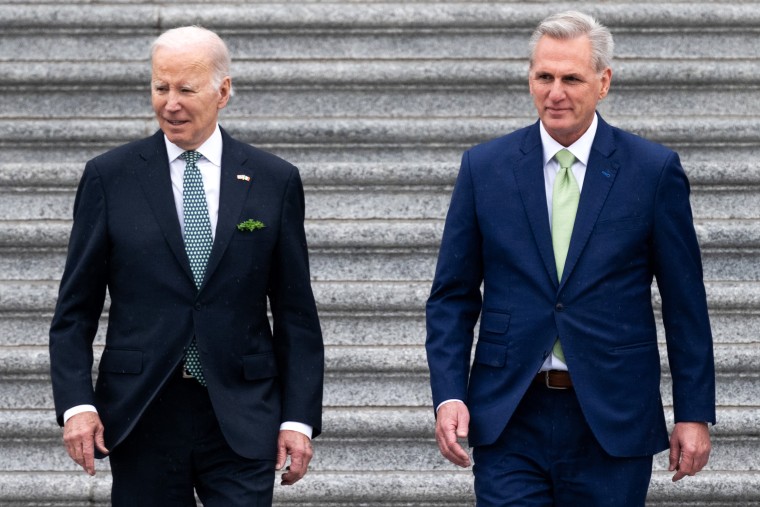WASHINGTON— President Joe Biden said Wednesday ongoing debt ceiling negotiations could disrupt plans to meet with allies in Japan and Australia this month and force him to participate in the summits virtually instead of traveling abroad.
With the Treasury Department indicating that the U.S. could reach the debt limit as early as June 1, Biden warned that failure to find a way out of the political standoff could cause him to cancel the trip or move the huddle with world leaders online.
“Depending on the state of play and the negotiations, it’s possible I would either have to delay the trip, not delay, not go and do it virtually,” Biden said in New York. "Or not go."
Biden plans to attend a summit of the Group of Seven major industrial countries in Hiroshima, Japan, to discuss the response to Russia’s invasion of Ukraine and tensions with China, followed by a “Quad” meeting in Sydney on May 24 with Japanese Prime Minister Kishida Fumio, Indian Prime Minister Narendra Modi and Australian Prime Minister Anthony Albanese.
Biden is also set to visit Papua New Guinea on his way to Australia to discuss regional security and economic and climate support, the White House said. It would be the first time a sitting U.S. president has visited the Pacific island nation.
Biden has said that responsibility for raising the nation’s borrowing limit falls on Congress and that he will accept only a bill to raise the borrowing limit with no strings attached. Republicans are trying to use the threat of default as leverage to force concessions on federal spending.
Failure to break the deadlock threatens the possibility of default on the nation's $31.4 trillion debt, an outcome that could trigger panic on Wall Street and bode possible political ramifications for Biden heading into his re-election campaign.
Asked whether he agreed with House Speaker Kevin McCarthy’s assertion that congressional leaders had to reach a deal in principle by early next week, Biden demurred, telling reporters Wednesday that he was “not going to make those kinds of judgments.”
“I’ve been involved in negotiations my whole career,” Biden added. “Some negotiations happen in the last second. Some negotiations happen way ahead of time. So we’ll see.”
Biden and congressional leaders had an acrimonious sit-down Tuesday that McCarthy, R-Calif., characterized to Republican members as a waste of time. The group is due to meet again Friday before Biden is scheduled to depart for Asia next week.
The fight over raising the debt ceiling has evoked the brinkmanship that took place a decade ago when President Barack Obama tussled with congressional Republicans over the same issue.
In October 2013, Obama canceled a planned trip to Asia so he could remain in Washington to negotiate an end to a government shutdown and reach a deal that would raise the debt limit.
Ten years later, Biden finds himself in a similar situation. He is scheduled to leave for Japan next week for a series of meetings with his foreign counterparts. If he skips the trip to remain at the negotiating table in Washington, he would miss a key opportunity to rally U.S. allies in curbing China’s military and economic ambitions.
But if he decides to go, he would be halfway around the world as the deadline approaches for an unprecedented default.
Biden first warned Tuesday that the standoff could throw the Asia trip into disarray.
“I’m still committed, but obviously, this is the single most important thing that’s on the agenda,” he said after a meeting with congressional leaders at the White House.
Biden said skipping the trip was “not likely” but added, “It is possible.”
“If somehow we got down to the wire and we still hadn’t resolved this and the due date was in a matter of when I was supposed to be away, I would not go,” Biden said. “I would stay until this gets finished.”
Jason Furman, a top economic adviser to Obama during his presidency, said Biden may not need to be in Washington to break the impasse.
“Presidents don’t need to negotiate everything personally themselves,” Furman said in an interview. “He has good people around him who are trusted and respected on these issues.
“So my hope is that the government can do more than one thing at once, but you never know.”

